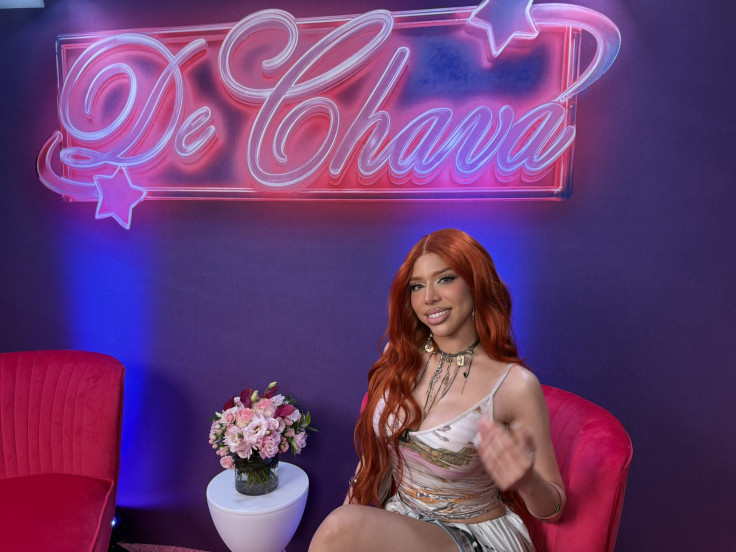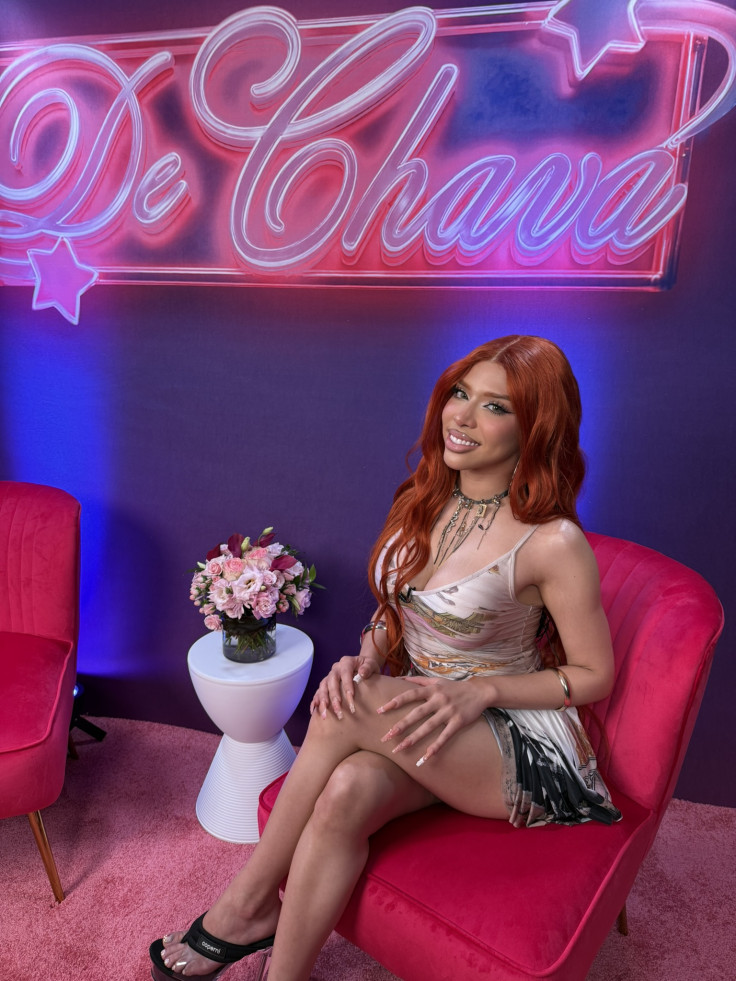
Yeri Mua is not playing it safe. Not in her lyrics, not in her outfits, and definitely not in her life. "I didn't even like my first song," the 22-year-old Mexican artist confesses. "But I released it anyway. And here we are."
Here we are, indeed. From livestreaming makeup tutorials in Veracruz to sitting in front of the American press in Miami promoting her debut album De Chava, Yeri Mua—real name Yeri Cruz Varela—is living out the very interviews she once dreamed of giving as a little girl in front of the mirror. The album is equal parts perreo and heartbreak, feminism and fantasy, boldness and softness—just like her.
"I used to play pretend that I was being interviewed in the U.S.," she says with a half-laugh, half-sigh during an interview with The Latin Times and ENSTARZ. "So this? This is surreal."
A Glitter-Drenched Beginning
Born in 2001, Yeri first rose to fame as a beauty influencer, where her candid livestreams, glam tutorials, and unapologetically blunt takes made her a sensation. She built a loyal following—mostly Gen Z girls who saw themselves in her—and just as many detractors, especially when she spoke openly about sex, body image, or her relationships.
But it was music that opened a new lane. "It wasn't my plan," she says honestly. "A friend pushed me to do a song. I didn't even like it. It was reggaetón mexa, which I hadn't even chosen. But it took off."
Reggaetón mexa—Mexico's local take on urbano—has been gaining traction in recent years, and Yeri unexpectedly became one of its loudest (and pinkest) voices. "I grew up on pop and party music from the early 2010s—Ke$ha, Rihanna, that vibe," she says. "But I also grew up with reggaetón all around me. 'El gato volador,' all of that."
Crafting De Chava: Pretty, Powerful, Personal
Yeri's album De Chava isn't just a reggaetón record—it's a statement. It's full of flirtation, glitter, sadness, and rage, all dressed in baby pink. Songs like Tinkerbell are heartbreak anthems wrapped in fantasy references. Others are straight-up declarations of sexual agency. "I love that song," she beams. "It's sad, but cute. Like, Estoy llorando pero en tacones."

She's a self-proclaimed girly girl. "I used to be a makeup artist, so beauty has always been part of my life," she says. "My closet? It's all pink. Glitter, wigs, thigh-high boots. That's who I am." Her music, she explains, had to reflect that. "I'm not pretending. I'm showing who I really am—sweet and strong, vulnerable and bitchy. All of it."
But De Chava also has a political undercurrent, especially when it comes to sexuality and gender. "Why can men sing about sex and women can't?" she asks. "I have the power over my body. I decide who I sleep with. I can talk about sex in my songs because it's real. We all do it, here and in China."
Embracing the Taboo, One Lyric at a Time
Her approach is both shocking and refreshing. While reggaetón has long been a male-dominated, often misogynistic genre, Yeri takes the same language men use and reclaims it—with humor, style, and zero apologies.
"Yes, I talk about wanting sex," she says, completely unfazed. "But I wrap it in glitter and pink. That's the twist. I'm talking about taboo stuff, but it still feels feminine. Campanita de Peter Pan and all."
She credits Ivy Queen, Karol G, and even Shakira as women who laid the foundation—but she's aware she's doing something even riskier. "I go one step further," she says. "I don't just hint. I say it. And girls thank me for it."
From Influencer to Artist: A Battle for Belonging
Even with millions of followers across TikTok, Facebook, and Instagram, Yeri still hesitated to call herself a singer. "I felt silly saying it," she admits. "Like, am I really an artist? Or am I just a girl who got lucky?"
The imposter syndrome didn't come from herself—it came from the internet. "People made me feel like I was mocking real artists," she says. "But I realized, no. Anyone who creates something from the heart is an artist."
She points to her journals. "I write a lot. I'm super romantic. I fall in love all the time. I cry a lot. And all of that goes into my lyrics. So yeah, I'm an artist."
Her Toughest Battle: Mental Health
Despite the glam and glitter, Yeri is candid about her struggles with mental health. "I've been in psychiatric care on and off for two years," she says, her voice softening. "I've had therapy since I was a child because I never felt understood. I was too loud, too much."
She's brutally honest about how online hate affects her. "I still get really hurt. I cry. But when it's bad, I think of my family—my mom, my dad, my brother. They love me just as I am. That's what keeps me going."
Her advice for surviving online hate? "You learn to block out the noise. If a comment doesn't help me grow, I toss it. If someone wants to offer real advice, I'll listen. But if it's just to hurt me? Chinga tu madre. That's my favorite phrase. It's liberating."
Building a Future, Not Just a Brand
What drives her isn't just fame or money. It's legacy. "I want to be a mom by 30," she says. "Have a family. Maybe step out of the spotlight. But first—I need to grind. I need to work like crazy so I can have that life."
She knows she still has a long way to go—musically, personally, spiritually. "I'm still discovering who I am. But I'm not going to stop now. There are girls watching me, and if they see me living my truth, maybe they'll feel like they can too."
Yeri Mua is still a work in progress. But she's showing every messy, beautiful part of the process. In an industry obsessed with perfection, she's glitter and grit. And if she has to scream about sex, mental health, or being misunderstood while dressed like a Bratz doll? She will. Loudly.
© 2025 Latin Times. All rights reserved. Do not reproduce without permission.







